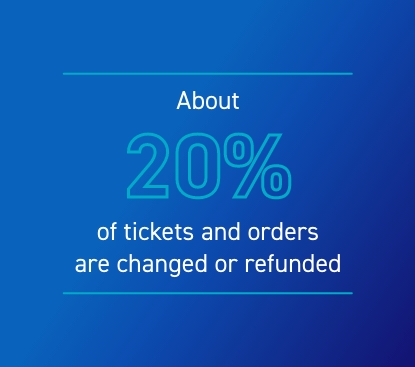
Have you ever had to change your airline ticket, but needed to contact your travel agent or an airline agent in person in order to make that change? Or maybe you’re the agent who deals with a stack of complicated changes and refunds by manually researching each one. Making changes to an airline ticket can sometimes be a confusing manual effort, but now, there’s a better way.
Automating as many of these changes and refunds as possible saves travelers, travel agents, and airlines time and effort, creating a better, more user-friendly experience for everyone.
How many airline tickets are changed or refunded?
In 2023, it is estimated that 10-15 percent of all airline tickets were changed, but only 40-45 percent of those changes were completed using automation. Nearly five percent of all tickets were refunded, but only about five percent of those refunds were processed using automation. This means that a significant number of ticket changes and refunds are still being processed manually.
How does changing and refunding airline tickets affect revenue?

With approximately 20 percent of tickets being changed or refunded, it’s probably not surprising that there are significant effects in terms of revenue. In 2023, US airlines handled nearly USD 1 billion in cancellation penalties and change fees, and IATA’s financial settlement system processed USD 18.5 billion in refunds for non-US agency sales. Automating these processes not only improves how quickly they can be resolved, but also helps increase how accurately these fees and penalties are assessed. The small differences involved in millions of transactions adds up quickly, affecting everyone’s bottom line.
Why is it sometimes so hard to change an airline ticket?
The data behind changes to an airline ticket can get really complicated. There are multiple layers of business rules that must be available to the systems that process the changes in order to figure out which fares can be used for the changed itinerary and how much that change will cost. These factors create a complex process for changing a ticket, increasing the need for a smoother, more automated way to ensure airline customers receive fast and reliable servicing.
What would make it easier to update an airline ticket?
Each airline can organize its change and refund policies and code them according to airline standards followed by the whole industry.
Right now, if no data is coded, according to these standards, the change or refund request defaults to manual processing. By the end of June 2024, that default will change. Instead, the request will automatically pass processing by following default industry guidelines when no data is coded.
This change will make it easier for more change and refund requests to be processed automatically and will support the industry’s goal to achieve fully automated servicing of airline tickets and orders by 2026. This change will also reduce the amount of debit memos that are caused by errors from manual calculations.
Who benefits from more automated changes and refunds?
Passengers, agencies, and airlines will all benefit from more automation of the change and refund processing. Here’s how:
- Time and costs savings for agencies and airlines from not having to process changes and refunds manually.
- Agencies receive fewer debit memos (ADMs) issued due to incorrect manual calculations.
- Fewer “surprises” for all parties because policies are applied consistently.
- Repricing is more accurate, ensuring the airline’s policy is applied correctly and does not result in over- or under-collections for passengers and airlines.
- Customers are more likely to be satisfied with quicker servicing, since it is easier for airlines to adhere to best practices for change and refund policies for both shopping and servicing offers.
What do airlines have to do to get ready for this change?
Any airline who interlines, code shares, or distributes their fares via third parties is affected by this upcoming update. Each of these airlines should review their policies now:
- Airlines who don’t have any automated rules coded are deciding what they need to add.
- Airlines who have some of their policies coded are deciding what else they need to add.
- Airlines who already have all their policies coded are making sure they’re all set.
How can ATPCO help with this change?
There are a lot of situations and policies to consider, in addition to understanding how to code all of this information to be automated, so it will take some time. However, ATPCO has a number of resources to help an airline understand and manage any updates it needs to make:
- A Reissue Policy Organizer, which is a wizard that walks you through what you want to indicate and how to achieve it through coding ATPCO Rules categories
- A Q&A session at Elevate + TravelConnect on 11 April in Washington, DC
- Two webinars explaining the changes and what needs to happen
- Many more resources on MyATPCO
Let ATPCO’s team help you navigate this change coming on 30 June 2024. Our team can help you understand what your airline needs to do to prepare for this increase in automation of changes and refunds!



